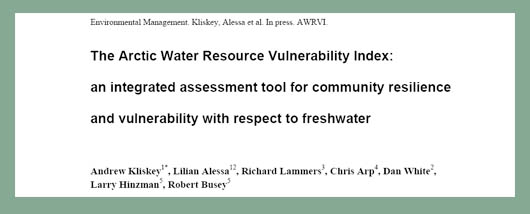INDEX
Currently working on Community of Practice: Agent-Based Modelling for the Social Sciences (NSF # 0623162)
Arctic Water Resources Vulnerability Index (AWRVI).
Printable Brochure (Adobe file - Prints onto 11x14 Letter Paper)
Resilience Alliance
Santa Fe Institute
HARC Hydrology Project
Matt Nolan's EarthSLOT visualization tool
Complex Systems at UAA
Water & Environmental Research Center UAF
The Justice Center
ARCUS
National Science Foundation
Earthwatch Institute
Amaral Research Group
US Fish & Wildlife Service - Fisheries & Ecological Services
Arctic Water Resources Vulnerability Index (AWRVI)
The Arctic Water Resources Vulnerability Index (AWRVI)
Why was AWRVI developed?
- No index exists to assess resilience and vulnerability of people in the Arctic to changes in water resources.
- Freshwater is critical to the sustainability of humans in the Arctic.
- People face uncertainty in their day-to-day lives due to environmental changes.
- The need for communities to determine their vulnerability to changes in freshwater resources is becoming more urgent.
- The Arctic presents a challenging set of factors: very remote communities with poorly developed infrastructure and high energy costs, a rapidly changing climate, and an often limited abundance of liquid water much of the year.
What is AWRVI?
- A composite water index to evaluate the well-being of Arctic communities with respect to fresh water.
- It integrates a range of existing and community-specific water-related data and information into a series of indicators to give an overall score.
- It provides a holistic profile of a community’s key water issues, allowing for intra-community and inter-community comparison and analysis.
- A community can use it to identify where strengths and weaknesses exist in water management.
Why use AWRVI?
- Water is one of our most critical resources.
- Being able to see the ‘big picture’ of the water that communities rely on is important to making good decisions.
- It provides a framework to map and assess water resources, use values and potential vulnerabilities under certain conditions.
How do I access AWRVI?
- AWRVI will be available on http://ram.uaa.alaska.edu.
- You can also call and request it be e-mailed or a hardcopy sent to you (see contact information below).
Who developed AWRVI?
- Researchers from the Resilience and Adaptive Management Group, the Water and Environmental Research Center, the Institute of Northern Engineering, and the International Arctic Research Center, University of Alaska.
- The Center for the Study of Complex Systems, University of New Hampshire.
- Alaska Science Center, The U.S. Geological Survey.
- The developers come from diverse cultural backgrounds, including small, resource-dependent communities.
Who do I contact for more information?
Lilian Alessa (afla@uaa.alaska.edu; 907 786 1507) or Andrew Kliskey (afadk@uaa.alaska.edu; 907 786 1136) Resilience and Adaptive Management Group, University of Alaska Anchorage.
